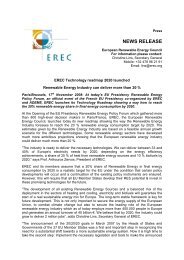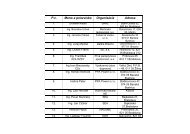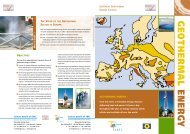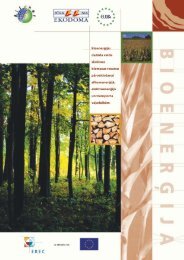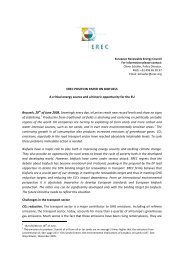CTO Assessment - European Commission
CTO Assessment - European Commission
CTO Assessment - European Commission
Create successful ePaper yourself
Turn your PDF publications into a flip-book with our unique Google optimized e-Paper software.
GOTLAND<br />
A Renewable Energy Island<br />
in the Baltic Sea<br />
Contact: Keith Boxer • Municipality of Gotland o Box 2067<br />
62156 Visby o Sweden • Tel.: 46-498-38380 • Fax: 46-498-38300<br />
E-mail: keith.boxer@telia.com • website: www.gotland.se<br />
Gotland is located in the middle of the Baltic<br />
Sea; it is the largest Swedish island. High costs<br />
for transports of energy, goods and people<br />
have contributed to a non-dynamic growth of<br />
the local economy.<br />
The island has a large RES potential in wind,<br />
biomass and, to some extent, solar energy.<br />
Island's energy strategy has to be considered<br />
within a broader sustainable development<br />
framework: on 14th October, 1996 the Municipal<br />
Council of Gotland published the Eco-<br />
Programme, which identifies the Municipalities'<br />
goal that "Gotland is to become an ecologically<br />
sustainable society within the course<br />
of one generation".<br />
Main aims and motivations<br />
The target of achieving 100% renewable energy<br />
balance by 2025 has arisen from the<br />
Municipalities plans to achieve a sustainable<br />
society within the course of a generation. The<br />
advantage of having a long-term plan with a<br />
specific year is that other planning which involves<br />
the production of short-term plans can<br />
become a part of the overall objective.<br />
To achieve an increase in the use of renewable<br />
energy on Gotland with the aim of reaching<br />
100% requires an active involvement from all<br />
sectors of society.<br />
What has been achieved?<br />
An energy plan has been produced outlining<br />
development to 2005. In this plan<br />
the target is 40% from sustainable energy<br />
sources by 2005. A plan for 100%<br />
for renewables by 2025 is now<br />
underway.<br />
95% of the Island's district heating plant<br />
is supplied by renewable energy.<br />
20% of the Island's electricity comes<br />
from renewables.<br />
Bio-climatic, sustainable buildings are<br />
being built.<br />
Widespread energy saving measures are<br />
being implemented.<br />
Heating systems are being converted to<br />
biomass and solar energy.<br />
Bio-diesel is replacing fossil fuels in<br />
municipal fleets.<br />
The use of fuel-cells as part of a solarhydrogen<br />
transport system is being developed<br />
for Visby.<br />
Main innovative aspects<br />
The most outstanding aspect is the establishment<br />
of a long-term plan for energy sustainability,<br />
with a wide participation range (sme's,<br />
university, local authorities, regional energy<br />
agency and local utility). An important complementary<br />
measure is the introduction of<br />
green certificates in the beginning of 2003.<br />
Enabling factors<br />
The Municipality of Gotland has shown in a<br />
number of plans and decisions that its aim is<br />
to support sustainable development.<br />
Other relevant factors:<br />
National financial support for local energy<br />
management agencies.<br />
10% capital grants for windpower developments<br />
and power purchase support.<br />
Support for municipal energy advisors.<br />
25% capital grant to domestic solar<br />
heating/hw systems.<br />
Grants for solar heating on public buildings<br />
and grants to convert domestic heating<br />
from electrical based systems.<br />
Max. Objective (2025)<br />
Challenges<br />
Grid infrastructure: Grid connection has<br />
been restructured to allow export.<br />
Government policy: The establishment of<br />
bio-ethanol production depends on governmental<br />
taxation system for fuels.<br />
Low energy prices: cheap nuclear and<br />
hydropower via sea cable from mainland.<br />
Acceptance of wind power: public resistance<br />
from, e.g. summer-house owners provides<br />
a challenge for the democratic process<br />
to fulfil all the potential of wind power<br />
on and around Gotland.<br />
Replication Potential<br />
During five years a large number of other<br />
island representatives visited the island,<br />
because of their interest in Gotland's<br />
project. There have been approaches at an<br />
international level due to the publicity received<br />
by the <strong>CTO</strong> website and <strong>CTO</strong>-award,<br />
with visits from as far afield as Japan and<br />
even Australia.<br />
Change in perception of implementing<br />
RES projects (1999 - 2003)<br />
Interest in replacing fossil fuels is increasing<br />
among the general public.<br />
Acceptance of wind power by the local population<br />
is to a great extent influenced by<br />
whether or not some form<br />
Achieved<br />
Solar TH- PV 3MWp/15,000m 2 52 m 2<br />
Wind<br />
Max. Plan 1,100 MW<br />
Private owned 50 MW 10MW<br />
Small Com. WF 150 MW 30MW<br />
Small Com. WF 500 MW 30MW<br />
Utility Owned 400 MW 20MW<br />
Biomass<br />
Combined HP 150GWh/30MW 0<br />
Dwelling 10,000/400GWh 5,150/200 GWh<br />
Biogas 25/400GWh 3/12 GWh<br />
Biofuels 24,000 tons 0<br />
Number of jobs created: 45<br />
Res Increase 18 %<br />
Reduction of CO 2 :295 kton<br />
of local benefit occurs as<br />
a result of any developments.<br />
Politicians and civil servants<br />
have been informed<br />
about the ambitious energy<br />
and environmental<br />
targets already set. Technicians<br />
in the municipalities<br />
property department<br />
have been trained.<br />
70 <strong>CTO</strong> - Showcase



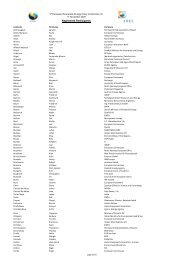
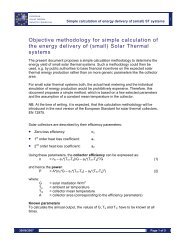
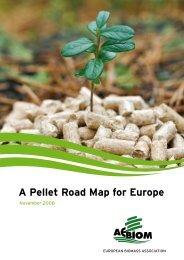
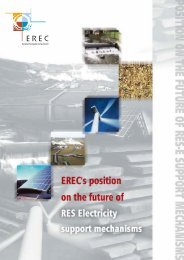
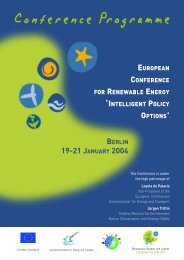
![Energy [R]evolution - Greenpeace](https://img.yumpu.com/47174859/1/184x260/energy-revolution-greenpeace.jpg?quality=85)
